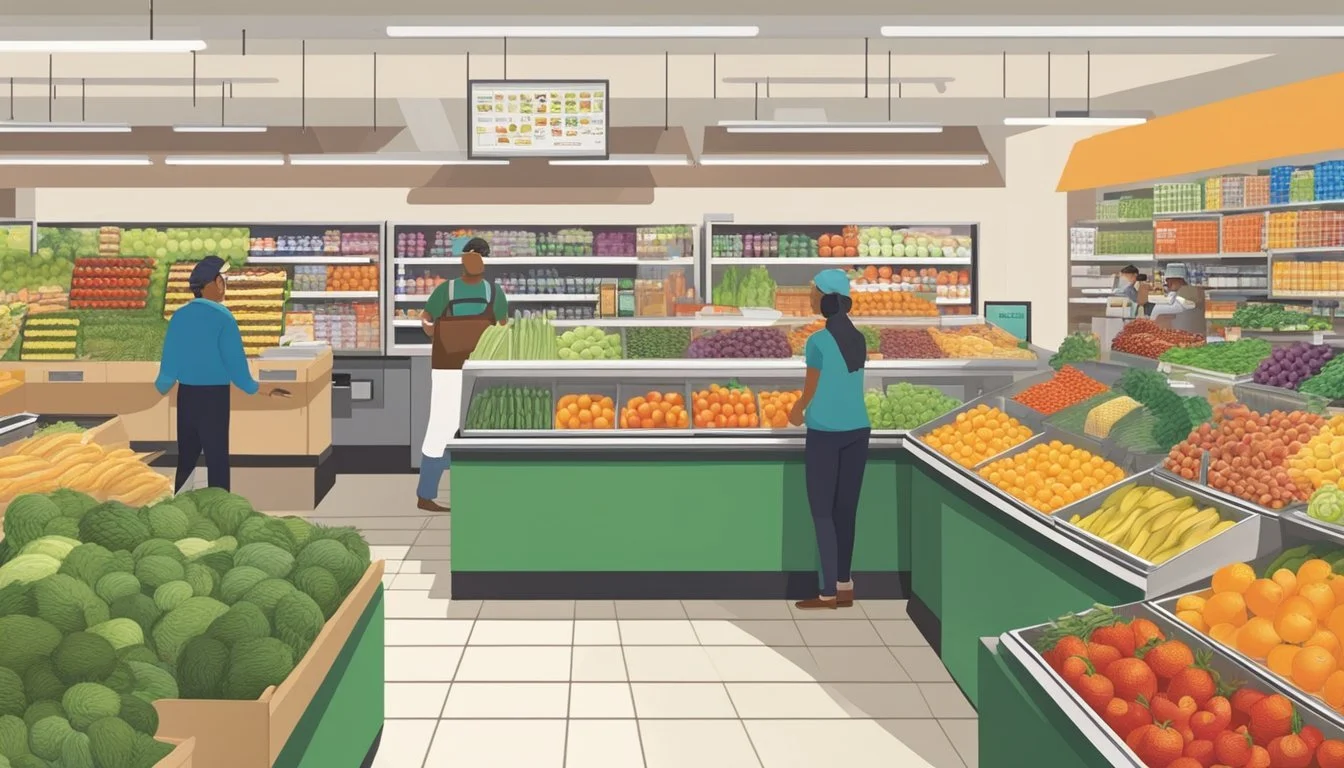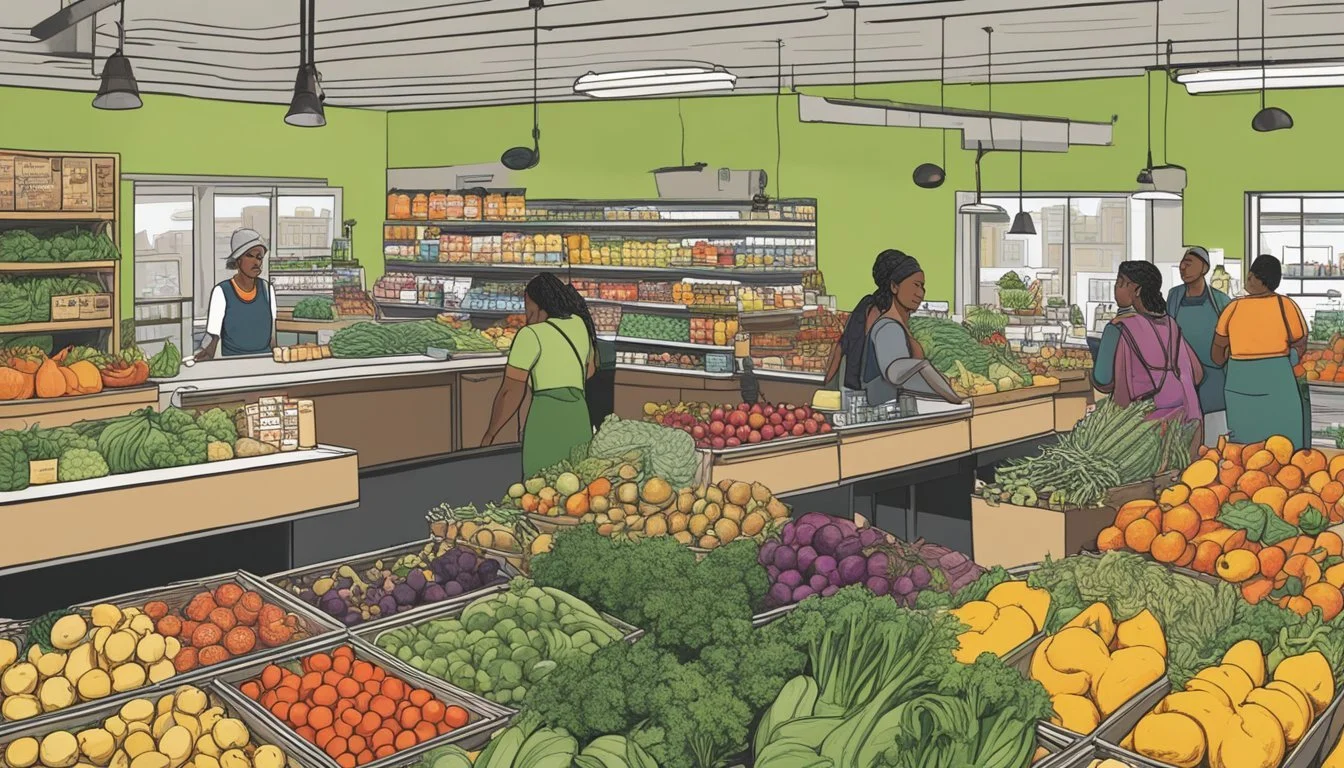Guide to Food Co-Ops in Syracuse, NY
Your Source for Local, Organic Produce
In Syracuse, NY, community-owned alternatives to conventional supermarkets are gaining attention. Food co-ops like the Syracuse Cooperative Market are at the forefront, offering a unique grocery shopping experience rooted in a commitment to local, organic, and whole foods. Standing apart from traditional grocery stores, these co-ops operate with the community's interest in mind, ensuring that the benefits are mutual and the focus remains on the health and sustainability of the local food system.
The concept of a food co-op is simple yet impactful: it is a grocery store owned and run by members of the community it serves. This structure allows for a democratic approach to business, with members often having a say in the products stocked and the practices adopted. In Syracuse, the Cooperative Market has been a staple in communities like the Westcott neighborhood, offering an extensive range of local and natural products for over 50 years.
By fostering a close-knit relationship between consumers and producers, Syracuse food co-ops ensure that the local economy thrives and that consumers have access to fresh, high-quality products. The transparency in the food sourcing and the shared goal of supporting sustainable agriculture make Syracuse's food co-ops a valued part of the city's fabric, inviting a sense of connection and responsibility among members and non-members alike.
The Basics of Food Co-Ops
In the context of Syracuse, NY, food co-ops serve as community-centered alternatives to standard grocery stores, operating under democratic principles and focusing on local and organic products.
Understanding Co-Ops
A food co-op, or cooperative, is a member-owned and governed business that operates for the benefit of its member-owners according to common principles agreed upon by the cooperative movement. In Syracuse, like the Syracuse Real Food Co-op, individuals become members by purchasing an equity payment, which represents their share of ownership and their commitment to the store. These memberships enable individuals to have a say in the operational decisions of the store through democratic processes, often one member one vote, and ensure that profits are distributed back to the member-owners or reinvested in the co-op.
Benefits of Food Co-Ops
The benefits of food co-ops, particularly in areas like Syracuse, are manifold:
Economic Empowerment: Members have a stake in the cooperative's success and frequently receive dividends or reduced prices on goods.
Local Focus: They prioritize sourcing from local growers and producers, which supports the regional economy.
Health and Wellness: Offering a range of local, organic, and whole foods, co-ops like the Syracuse Cooperative Market, cater to consumers seeking healthier, environmentally friendly options.
Community Engagement: Food co-ops often become community hubs where people gather not just to shop but to connect and participate in events and education centered around food and wellness.
Getting Involved
In Syracuse, food co-ops offer a unique way for individuals to engage with their local food system, providing opportunities for membership participation, shared governance, and community volunteering. These cooperative entities function beyond mere grocery shopping experiences, evolving into integral pillars of local commerce and connection.
Becoming a Member
Individuals interested in integrating with the Syracuse food co-op scene can start by becoming members. Membership often comes with benefits such as discounted pricing, special orders, and financial dividends. To become a member, one typically pays an equity investment or annual fee. This financial contribution signifies both a stake in the co-op and support for local and sustainable food systems.
Procedure to Become a Member:
Complete the membership application.
Pay the equity investment or fee, which varies by co-op.
Understand member rights and responsibilities.
Member Participation
Member participation is a cornerstone of food co-ops, embodying the principle of democratic control. Members have the right to vote on important matters including the election of a member-elected board of directors, who oversee the governance of the co-op. This structure ensures that the co-op operates in the best interest of its members and the community.
Ways Members Can Participate:
Voting: Exercise the right to vote in elections and on significant co-op issues.
Board Involvement: Run for a position or support board members in enacting policies.
Volunteering Opportunities
Volunteering represents another avenue for members and non-members alike to get involved. Co-ops often rely on volunteers for various functions, which can include assisting during events, providing education to the community, or even helping with daily operations. Such engagement helps reduce operational costs and fosters a sense of community.
Common Volunteering Roles:
Event support
Outreach and education
Store maintenance
Note: Individual co-ops may have specific volunteering requirements and opportunities, so it is advisable to inquire directly with the co-op of interest for the most accurate information.
Shopping at Food Co-Ops
Shopping at food co-ops in Syracuse, NY, provides a unique experience for consumers looking for diverse, locally sourced, and health-conscious products. These cooperatives cater to a wide array of dietary needs with a focus on fresh produce and organic items.
Product Selection
When visiting food co-ops, shoppers can find a variety of products that range from pantry staples to specialty ingredients. They often have a large organic bulk foods section, which allows customers to purchase items like grains, nuts, and spices in desired quantities. A well-stocked cheese and meat department often features artisanal and locally-sourced options, giving an edge to freshness and quality.
Local and Organic Offerings
Food co-ops excel in providing local and organic produce to their patrons. This not only supports local farmers and the economy but also offers consumers the chance to buy products that align with sustainable and eco-friendly practices. Fresh produce sections are prominent, with a focus on organic fruits and vegetables that boast peak flavor and nutrition.
Special Dietary Options
Understanding the needs of shoppers with specific dietary preferences is a hallmark of food co-ops. They typically offer a variety of vegetarian, vegan, and gluten-free products. For individuals following a keto-friendly diet, food co-ops provide suitable options such as low-carb snacks and sugar alternatives. These establishments aim to cater to the health-conscious and those with dietary restrictions by offering specially curated selections.
Syracuse Food Co-Op Locations
Syracuse boasts a variety of food co-ops that cater to the community's preference for local, organic, and sustainable food options. These stores are not only retail spaces, but also social hubs where individuals with similar values can connect.
Syracuse Cooperative Market
Syracuse Cooperative Market is a well-established hub for organic and local produce. Its Kensington store, located at 618 Kensington Road, prides itself on being a valuable part of the community since 1972, offering a diverse range of quality food choices.
Downtown Syracuse
In the heart of the city, the Salt City Market branch of the Syracuse Cooperative Market serves downtown Syracuse's needs. Situated at 484 S. Salina Street, it ensures ample availability of fresh greens and other natural foods every day.
Other Locations
Beyond the central Kensington and downtown stores, Syracuse Cooperative Market is a prominent presence in the Westcott neighborhood, further expanding its reach to serve various communities within Syracuse, New York. Each location is dedicated to upholding the co-op's mission of mutual benefit and support to its members and the surrounding neighborhoods.
Community Engagement
The Syracuse Cooperative Market actively fosters community engagement by hosting educational events and forming strategic local partnerships. These efforts aim to connect consumers with local farmers, promote regional food, and advocate for sustainable practices, enhancing community welfare.
Educational Events
Syracuse Cooperative Market organizes events to educate the members and the public on the importance of supporting local agriculture and understanding the benefits of organic food. They also communicate the value of programs like Double Up Food Bucks, which incentivizes the purchase of local produce by doubling the value of food stamps when spent on local fruits and vegetables.
Upcoming Events:
Local Harvest: Learning about seasonal produce.
Sustainable Living: Workshops on reducing food waste.
Local Partnerships
By collaborating with local businesses and farmers, Syracuse Cooperative Markets contribute to strengthening the regional food system. They partner with coffee shops like Cafe Kubal, reinforcing community ties and supporting local economic growth.
Key Partnerships:
Local Farmers: The store sources produce to reaffirm community reliance on regional food resources.
Cafe Kubal: As a coffee shop and full-service roaster, it receives patronage from the cooperative, highlighting the interconnected nature of local businesses.
These engagements demonstrate the cooperative's commitment to education and the support of local, sustainable, and organically focused food systems.
Economic and Social Impact
Food co-ops in Syracuse, NY contribute significantly to the economic vitality and social fabric of the community. They embody the cooperative principles and support the local economy by investing in regional food systems and promoting equitable shares in economic activity.
Cooperative Principles
Co-ops operate on a model of shared ownership and democratic governance which ensures that the economic benefits are distributed amongst members rather than external stakeholders. Syracuse Cooperative Market is a prime example of a community-owned enterprise that operates with member economic participation at its core. Each member's investment in the co-op strengthens its ability to serve the community and supports its continued growth.
Supporting Local Economy
Economic Investment: Cooperative Fund of the Northeast (CFNE) is an example of how cooperatives invest in the local economy. CFNE has a history of disbursing loans to enhance co-op initiatives. In Syracuse, these investments often go towards sectors like food co-ops which, as of 2021, represented 37% of CFNE's loan portfolio.
Community Ownership: These co-ops are collectively owned by local community members, ensuring decisions are made for the benefit of the local populace rather than external shareholders.
Local Family Farms: By prioritizing sourcing from local family farms, food co-ops help to sustain regional agriculture and ensure that money spent on food remains within the community.
Regional Food Systems: Initiatives like the Syracuse-Onondaga Food Systems Alliance (SOFSA) work as a collaborative network to strengthen regional food systems. This benefits multiple stakeholders within the food economy, including producers, retailers, and consumers.
These efforts by food co-ops make for a resilient local economy and foster a sense of community connection, tangible through every purchase and interaction within the co-ops’ ecosystem.
Resources and Contacts
For individuals looking to engage with the Syracuse food cooperative community, this section provides essential information on membership, contact details, and event schedules. Resources are intended to facilitate easy communication and active participation in cooperative initiatives.
Membership Information
To become a member of the Syracuse Cooperative Market, interested parties should contact the market directly. Membership benefits typically include discounts, special offers, and participation in the governance of the cooperative.
Contact for Membership Inquiries:
Email: membership@syracuse.coop
Phone: (315) 472-1385
Contact Details
Individuals can connect with the Syracuse Cooperative Market for general information or specific inquiries through various communication channels. The co-op prides itself on being readily accessible to the community.
General Contact Information:
Email: info@syracuse.coop
Phone: (315) 472-1385
Hours of Operation:
Monday to Sunday: 8 AM - 9 PM
Events Calendar
The Syracuse Cooperative Market maintains a calendar of events including community gatherings, educational workshops, and board meetings. Minutes from board meetings are often made available to members upon request. The market's events focus on promoting sustainable living and community engagement.
Upcoming Events:
Monthly Board Meeting: First Tuesday of each month, 7 PM
Weekly Local Producer Spotlight: Saturdays, 10 AM - 2 PM
Seasonal Cooking Classes: Dates vary, see website for details
Events Contact:
Email: events@syracuse.coop
Phone: (315) 472-1385







